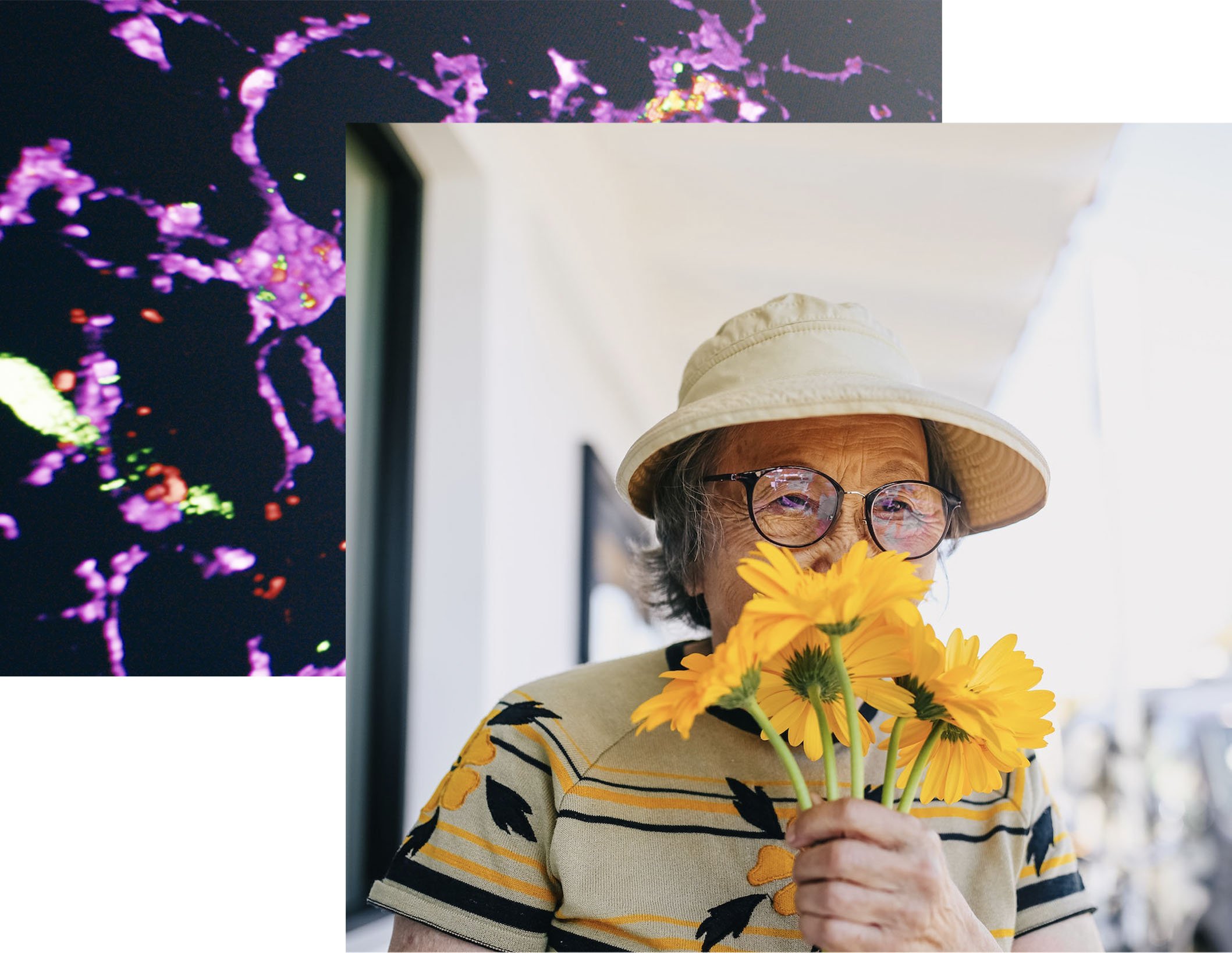
Wild & Precious focuses on raising awareness and teaching a generation of women how to spot and talk about dementia. One of our key values is learning from people with lived experience of dementia and this is at the heart of the project. The spotlight is on the incredible women who are living with the condition, who are carers and those who have experienced the illness via loved ones. By combining these personal stories with creative technologies, Wild & Precious brings a new approach to an ongoing problem.
Charlotte's Memory
"One of my most beautiful days was my wedding day.
It's about my wedding to Andrew. Okay, so that was, gosh, quite a long time ago. We had a lovely wedding with lots of friends.
I wore a wedding dress that fitted me well at the time. I can't get into it now but we have still kept it thinking Henrietta might wear it when she gets married.
It was lovely. It was perfect.
I remember having a bouquet of roses and seeing all my friends and godparents and all the people who bothered to come from far and wide.
We were rushed off on our honeymoon.
They put old tin cans on the back with a bit of rope or something like that. I don't think people do that now, do they? Such a shame.
Happy memories are easier to remember aren't they. Just had a happy life really, yeah.
Sometimes it feels like it goes really slowly. And sometimes it whizzes by but that's probably for everybody.
I want to get on and do more things before it's too late.”
Nenetia's Memory
“We lived in Clarendon in Manchester in Jamaica. And little place called Bunn Believe it or not just Bunn.
And he had his, you know, he built his own house and he grew coffee and he grew pears and he grew , grapefruit and chocolate, those, you know, produce.
So you know, we had food and yam. So we had food to eat and enough for my mom to go and sell at the market as well, which would bring in a bit of produce. And so they thought they decided they'd get married before he came. And he they did that.
What the memory that stands for me is where we lived, there's a river you have to cross and they'd gone over to the main town to get married. And then they had to come back to their house.
When you get to the river, it had rained so it was flooding. And I can see my dad now picking up my mom in a wedding dress and carrying her coat I just haven't forgotten that picture as a child and I must have been at that time about seven years old, and he carried her over the river. And I've not lost that picture. It's just stayed with me.
And and also in that place, I think maybe that home was security for me because also in that place, As a three year old I was given a chocho seed which I planted and up until I don't know what's happened now but up until about six years ago that it's a vine it goes down the road and people will just pick when it's in season people will just pick chochos as they go past. all those years and I left jamaica at 10 and a half and from age three it just continued growing and that that's a lovely memory to you know that's when I learned plant loves me so I must love them back.”
THE BUTTERFLY ROOM
THE BUTTERFLY
Rosie speaks of her wedding day and the longing for the presence of a particularly important guest.
THE BUTTERFLY MEMORY
My dad died when I was very young—just two years old, yet he is still part of me and my life.
When I got married his spirit was very much with us—I even wrote part of my wedding speech on his behalf.
“Love is one of the most powerful forces in the world. It can break hearts but it can also heal them. Love gives us great strength and courage.
Love can even be felt beyond the physical realm, we have all lost those we care about. I believe that those we have lost send us little signs to let us know they’re still with us - my particular sign is butterflies.
I wrote part of my wedding speech on behalf of my dad.
In the week leading up to my wedding, there was a black butterfly that would rest outside my window. I would see it and know it was a sign from dad. I kept hoping I would have a connection with him on my wedding day.
I spent the day looking and waiting. Then moments before walked down the aisle, a large black butterfly flew into the barn. It stayed through the ceremony.
After we had said our vows and signed the registry, the butterfly came fluttering down the aisle towards me and flew out into the world.
During the speeches, I read for my dad. The words I wanted him to give to me, filled by the hope of the butterfly: Keep your eyes open as love is all around us. Don’t ever be afraid to open up your heart, even if it’s been broken multiple times. Give love a chance and show it whenever and wherever you can. Be kind to one another and we can heal the world.
This will always be a magical moment, a memory that I will cherish. Thank you Baba for aways watching over me.
THE REFLECTION ROOM
THE REFLECTION
Jane looks back on a life of fun, love, and friendship. Musing on how her interests and relationships have evolved.
THE REFLECTION MEMORY
For me memories are more than moments in time, they’re feelings that you experience, feelings that define you and the way you live.
I look back on my years and there are objects that stir in me memories of who I was and who I am.
I have an antique jug I bought in France a few years back.
It says ‘Bien boire et laisser dire’, which roughly translates as “Drink well and talk freely’. By 'drink well' I presume they mean enjoy a decent bottle of something as opposed to necking 10 pints of lager.
Now I don’t want you to judge me as big party person or drinker.
I was when I was young - it was great - but ultimately drink and drugs were a social lubricant.
The reason I imbibed was, like many young people, for confidence, to be liked, disguise my phenomenal insecurity and imposter syndrome. Of course, it wasn’t called imposter syndrome in the 80s, more like the film ‘The Breakfast Club’, but in Scunthorpe.
When I reached 50 - and got the right HRT - those miserable insecurities largely disappeared and I started to find joy and satisfaction in smaller groups, my friendships deepened, and I became content and happy to be on my own, not constantly looking for validation.
I began to explore my friendships and find a deeper joy in them.
I asked more questions - what they thought about books, politics, music, their experiences. I love the warm fuzzy feeling that comes after a long cosy lunch with a friend when you’ve shared some beautiful experiences.
This is the sentiment that the jug evokes for me.
I love it just as much when you’re so comfortable with each other, that you can be silent.
Of course, there are books, there’s not a lot in life that can’t be found printed on a page.
There is one in particular - Maya Angelou’s book “Singing’ and Swingin’ and Getting’ Merry Like Christmas'
The title ties in with these sentiments, and always makes me want to smile. The narrative is a story of growth for Angelou following her struggles as a single parent, forming meaningful relationships and forging a career. It also marked the changing of her name to become the woman she desired to be.
I hold these memories, these feelings, close to my heart because they are reflections of life lived in its most beautiful incarnation - simple and joyous full of stories and connections.
THE RIVER ROOM
THE RIVER
Janet takes us on childhood holiday to the Scottish hills, as she follows a stream near where her father grew up.
THE RIVER MEMORY
My Dad grew up in Scotland. He joined the Royal Air Force and after the Second World War he was based in Bedford, England, where he met my mum, married and settled there.
But every summer, we would load up the car, join the Great North Road and head back to Dunbar in Scotland to stay with family for a week or two.
One summer day when I was nine or ten years old, my mum and sister decided on a shopping day in Edinburgh, and dad and his tom-boy daughter—that’s me— went fishing for trout out in the countryside.
Dad was under strict instructions from mum to ‘look after Janet’
It was a beautiful sunny day and dad paused outside a row of tiny derelict stone cottages where he and his orphaned brothers and sisters lived and worked for a local farmer.
It was hard to believe that anyone could have ever lived there in the middle of nowhere but he seemed to have fond memories of the place.
We walked down to the burn—the Scottish word for stream—and he showed me a pool where water toppled over from a small waterfall.
The water was crystal clear and the whole scene and sound of the water felt magical and has always stuck in my mind.
Moving on along the burn, dad went ahead to look for a good fishing spot. I tagged along behind, absorbed in the signs and sounds of the nature around me, yet in my own little world.
The water was so clear I could see the trout basking in the shallows, warmed by the sun.
It felt like ages since I’d seen where dad was, but he was keeping an eye on me—mum would have been pleased—because he called out to me “Jan, look behind you” and there on the overhanging bank above me and only a few feet away was a huge majestic stag, his antlers silhouetted against the sky.
We looked at each other for a few seconds and he turned and walked away.
That was four decades ago. For a nine year old it was a wonderful sight.
Looking back, it was a perfect day with dad and has always been precious to me.
I don’t remember if we caught any fish.
THESE MEMORIES WILL LAST FOREVER
Memories don’t last forever, but thanks to current technology these memories will. We’ve put these memories in the blockchain so they’ll never be forgotten.
Your brain is incredible. It controls your movement, emotions and stores your precious memories.
Evidence suggests that up to 40% of all cases of dementia are linked to factors that we may be able to influence.
It’s never too early to start making positive changes in these areas, because changes in the brain associated with dementia start many years before we see symptoms.
“For over a decade dementia has been the leading cause of death for women in the UK. Two in three people with dementia (65%) are women, and longer life expectancy alone does not explain this disparity.”
A report from leading charity, Alzheimer’s Research UK, highlights the impact of dementia on women.
For over a decade dementia has been the leading cause of death for women in the UK. Two in three people with dementia (65%) are women, and longer life expectancy alone does not explain this disparity.
This inequality is made worse for Black and South Asian women in particular, since people of colour face a health system of inequalities in diagnosis, care, and support, causing further issues.
Alongside this, women are also more likely to care for a loved one with the condition – making up around two thirds of unpaid carers, leading to additional financial and emotional strain on many.
Whilst across medical research, data is too often missing women, who are less likely to be included in clinical trials, creating an even bigger gap in relation to dementia. The gap is further widened when it comes to people of colour due to health system inequalities - a situation that impacts particularly Black and South Asian women.
The huge and varied impact the condition causes to lives means that women (55% compared to 42% of men) are more likely to agree that dementia is the health condition they fear most.
We need to focus attention on awareness, understanding and research for women.
All information found above is sourced from Alzheimer’s Research UK. To read further information and reports and please see the below:
Love your heart
What’s good for your heart is good for your brain. So, by giving your heart some love, by staying active, or eating well for example, you’ll also be protecting your brain and helping reduce your risk of developing dementia.
Keeping Blood Pressure in Check
There’s strong evidence linking blood pressure in midlife with brain health in later life.
Damage to these blood vessels leads to reduced blood flow in the brain and a greater risk of arteries becoming clogged. This can affect our ability to think and remember, as well as increase our risk of developing dementia.
Anyone over 40 should aim to have their blood pressure checked at least every five years and it’s a great opportunity to have a conversation about how you can keep it within healthy limits too.
Quit smoking
If you smoke, quitting is probably the most important step you can take to protect both your heart and your brain. As well as being linked to high blood pressure, heart disease, stroke and cancer, there’s evidence that smoking increases your risk of dementia.
Smoking has also been shown to thicken artery walls and narrow the blood supply around the body. This increases the risk of heart disease and stroke, which are both risk factors for vascular dementia.
The NHS offers lots of resources to help, and it won’t take long to notice the benefits. All of the harmful carbon monoxide will be flushed out of your body just 48 hours after your last cigarette and your circulation will improve in weeks.
Being active
Being active helps to prevent so many health conditions and it’s key to keeping your brain working properly too.
It can help you keep a healthy weight and reduces the risk of type 2 diabetes and heart disease. Both are known risk factors for dementia.
Several research projects, including the important HUNT Study published in 2018, have linked more exercise in midlife with a lower risk of dementia.
And in January 2021, scientists from the US published findings showing those who exercised more had less damage to the small blood vessels that spread through the brain.
Remember, being physically active doesn’t have to mean running 10k every weekend. Aim to be active every day and move more – whether that be by dancing, gardening or getting off the bus a stop early to get your steps up!.
Eating well
Eating well is essential for a healthy lifestyle. Much like physical activity, it’s an important way to reach and maintain a healthy weight and control blood pressure. A balanced diet should include plenty of fruit and vegetables, starchy foods like potatoes and brown rice, some protein like fish, beans or lean meat, and a small amount of dairy or dairy alternatives.
We all deserve a treat every now and then, but it’s important we enjoy them in moderation. Limiting foods high in saturated fat and sugar will also go a long way towards helping you stay in shape.
Drinking Responsibility
Heavy drinking can affect brain health, as well as being linked with cancer, stroke, heart disease and liver disease. Another good reason to follow the government’s recommendations of drinking less than 14 units and having several drink-free days each week.
The link between heavy drinking and dementia is well established, with one research study showing that 57% of participants who developed dementia before 65 had at some point been in hospital with an alcohol use disorder.
Long-term heavy drinking is also known to cause specific forms of dementia, including Wernicke-Korsakoff Syndrome.
Not sure how much you’re drinking? You can check your intake with Alcohol Change UK’s unit calculator or speak to your GP for advice and support.
Cholesterol is a fatty substance found in the blood. Research published by The Lancet shows that there is a link between having high levels of cholesterol in midlife and dementia risk in older age.
As scientists continue to study this link, there are lots of things you can do to prevent harmful levels of cholesterol building up in your blood. These include exercising more, reducing your alcohol intake and quitting smoking.
Eating healthier foods can also help prevent high levels of cholesterol. For example, diets high in healthy fats like Omega-3 have been associated with better brain structure and lower levels of cholesterol.
Keeping cholesterol at a healthy level
Managing Diabetes
Diabetes is a condition that causes your blood sugar level to become too high. It’s known to affect brain health, with studies published by the JAMA Network showing that having diabetes, particularly in midlife, is associated with a higher risk of dementia.
Research into this link is ongoing, but it’s clear that managing the condition is key to keeping your brain in shape.
The NHS advises that you can help prevent and manage type 2 diabetes by staying active and eating a balanced diet. These tips will also help you avoid other dementia risk factors, including heart disease and stroke.
There are lots of resources available to help if you think you have diabetes or might be at risk. Visit the Diabetes UK website to find out more.
Stay sharp
Taking time for your mental wellbeing, getting a good night’s sleep and regularly challenging your brain in midlife can help protect it as you age.
Regularly Challenging Your Brain
Researchers think challenging your brain helps to build your ‘cognitive reserve’. This is its ability to cope and keep working properly, even in the face of damage from diseases like Alzheimer’s.
Although understanding is growing all the time, it’s not yet clear which activities are most beneficial.
And activities that some people enjoy - and will therefore do regularly - aren’t for everyone. So, the key is to do things you enjoy, whether that’s reading, playing board games, art, learning a new language or something completely different.
Sleeping well
We all know that sleeping well can make us feel sharper and more rested. But there is some evidence to suggest that poor sleep over a long period of time can increase our risk of dementia.
However, the links between sleep and dementia are difficult to unravel. Scientists aren’t certain whether poor sleep increases the risk of developing the condition, or whether it’s a symptom of it.
To make things more complicated, many conditions that can increase our likelihood of developing dementia are also associated with poor sleep, including high blood pressure and heart disease.
Although it’s not yet clear exactly how sleep and dementia are linked, it’s generally accepted that getting at least seven hours of sleep a night is best.
If you’re struggling to get seven hours, don’t worry – it’s thought that negative effects are only seen after months or years of poor sleep. Sleep problems are very common, but luckily there are things you can do to help deal with them.
The NHS has lots of helpful tips for how to sleep better, including keeping regular sleep hours, and avoiding caffeine and alcohol before bed.
Keep connected
Research suggests that social isolation is linked to an increased risk of dementia, so keeping connected to the people around you is a great way to give back to your brain.
Social Isolation
Scientists aren’t sure whether social isolation is a risk factors for dementia, or whether it’s a symptom of the condition. However, one thing is for certain: keeping connected is good for our brain health.
Keeping connected can also help us feel happier and healthier in general, by spending time with loved ones, having virtual catch-ups with friends further afield and making new connections by joining clubs or volunteering.
Looking after your hearing
Several studies have identified a relationship between hearing loss and dementia risk. However, the nature of this relationship is unclear.
One area of research is looking at whether hearing loss indirectly affects dementia risk by making it more difficult for people to keep connected. A lack of social interaction and mental stimulation may contribute to low levels of ‘cognitive reserve’, making it harder for the brain to rewire itself in the face of damage from diseases like Alzheimer’s.
Other scientists have linked hearing loss with biological factors such as inflammation and a lack of blood flow to the brain, both of which are associated with an increased risk of dementia.
Lots of people experience hearing loss to some degree as they get older. If you’re worried about your hearing, why not try the RNID’s free online hearing check, or speak to your doctor and get it checked.
To find out more about this topic, read ARUK’s blog on the link between hearing and dementia.
What to do next
To get targeted advice and help on boosting your own brain health, visit Alzheimer’s Research UK and ‘Check-in’ with the charity’s ‘Think Brain Health’ tool which indicates how to support a healthier brain.
The evidence on brain health comes from careful scientific research, and it’s only through research that we will understand what causes dementia diseases, develop effective treatments, and improve the way those living with the condition are diagnosed.
If you would like to be a part of vital studies, register your interest at Join Dementia Research – a national service funded by the Department of Health, and delivered in partnership between the National Institute for Health Research (NIHR) Clinical Research Network, Alzheimer’s Research UK and the Alzheimer’s Society.
The UK Dementia Research Institute (UK DRI) is the UK’s leading biomedical institute dedicated to neurodegenerative disease, and to changing the lives of millions affected by dementia worldwide.
Hosted across six of the UK’s leading universities, our scientists, clinicians and technical staff are at the forefront of efforts to find new diagnostics, technologies, and treatments for dementia.
Our ambitious scientific vision encompasses 3 main priorities:
In order to treat dementia, we must first decipher the root origins and mechanisms of the diseases that cause it. There is still a huge knowledge gap in our understanding of these complex disorders. To tackle this challenge, we’ve assembled over 50 research teams focused on unravelling the molecular and cellular causes across a range of neurodegenerative diseases including Alzheimer’s, Parkinson’s, Huntington’s, vascular dementia and motor neurone disease. These discoveries pave the way to treatments.
Discovering the causes of dementia
We know that changes to the brain and nervous system begin decades before symptoms of dementia arise. We must therefore intervene at the earliest stages to effectively slow or stop these diseases before widespread damage has occurred. Harnessing the knowledge gained from our discovery research, we are developing new tools, technologies and tests to provide accurate and reliable diagnosis. Breakthroughs in this area will not only help identify those most at risk, but also enable important monitoring of disease progression as new drugs become available.
Diagnosing dementia at the earliest stages
Helping people live healthier lives at home
for longer
Although the UK DRI aims is to ultimately transform lives with treatments, we also recognise the significant unmet need for support for people living with dementia today. Our unique Care, Research & Technology Centre focuses on developing and testing new technologies to help the most vulnerable to live safely in the comfort of their own homes for longer. These sophisticated systems are the foundation for new ‘smart homes’, offering independence for individuals and peace of mind for loved ones.
In just five years, the UK DRI has already made important progress towards meeting these challenges. With large investments in people, partnerships and infrastructure, the UK DRI is now an internationally recognised institution at the cutting-edge of dementia science and innovation. Together, our discoveries bring new hope.


































